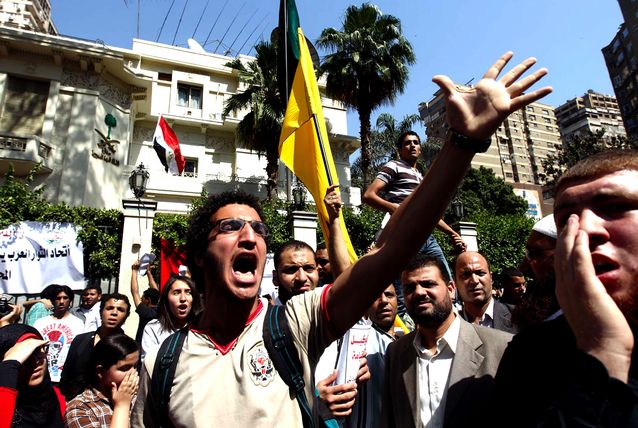RAFAH: Months after Israel warned of a suspected plot to target Israelis in Sinai, Egyptian police Thursday said they had arrested three Palestinians and are on the hunt for a fourth man in the Sinai Peninsula.
The three Palestinians arrested on Tuesday gave the security services the name of an accomplice who had been due to take part in the execution of the attack they were planning, a security source told AFP.
Police have launched a manhunt for this fourth suspect who is on Egyptian territory.
Late Tuesday, police in the border town of Rafah detained a Palestinian carrying an explosives belt who had slipped through a tunnel from the neighboring Gaza Strip.
Two more Palestinians suspected of being responsible for driving the bomber to a Sinai resort were later arrested in a rented flat in Rafah.
The security source said a total of 20 people, some Egyptians, some Palestinians, had now been detained for suspected links to the trio.
The arrests and manhunt come quickly on the heels of several arms caches discovered in northern Sinai near the Rafah border earlier this week.
In late January, a suicide bomber killed three Israeli civilians in Eilat when infighting between Palestinian factions intensified.
There had been speculation that the bomber had tunneled his way near the Rafah border crossing, but both Egypt and Palestinian security officials denied the link.
The border crossing has been closed since the bomb attack and in the wake of clashes between Fatah and Hamas factions two weeks ago which killed dozens.
Police sources said hand and rocket-propelled grenades were among the weapons found in the caches.
In late October, Israeli forces held off launching a major operation to seek and destroy tunnels used for arms and drugs smuggling along the Philadelphi Corridor, an 11 km stretch that is only 100 meters wide.
But according to former Ambassador to Israel Mohammed Bassiouny, Egypt is also concerned about arms making their way back into Sinai, which has seen bombing attacks at tourist hotspots in the past two years killing more than 100 people.
The tunnels can be used both ways, he said in an earlier interview, We don’t want weapons, drugs or people being smuggled into Egypt. [Therefore] we are opposed to the tunnels and we destroy them.
Bassiouny earlier told The Daily Star Egypt that Israel “might be forced to re-engage in the area if it believed Hamas was still effectively using the tunnels to smuggle weapons into Gaza.
Mohammed Kadry Saeed, military expert at Al-Ahram Center for Political and Strategic Studies, earlier said that reports of Egyptian police being moved into the area were part of efforts by the government to secure the region and prevent further acts of violence in the Sinai Peninsula.
The latest major attack to hit the Sinai Peninsula was in April 2006, when several bombers struck the popular southern resort of Dahab, killing 19 people.
After a seven-year lull, terrorist attacks returned to Egypt in 2004, when three bombs exploded in and around the Red Sea resort of Taba, killing at least 34 people.
Some 70 people were killed in July 2005 when multiple blasts struck the popular resort of Sharm el-Sheikh.
The bombings, as well as two smaller attacks targeting the Sinai-based Multinational Force and Observers, were claimed by Tawhid wal Jihad (Unity and Holy War), a group claiming links to the Al-Qaeda network.
Tunnels under the border between Egypt and the troubled Gaza Strip are often used for smuggling goods, people and weapons, despite frequent crackdowns by Egyptian police and border guards. With additional reporting by AFP



